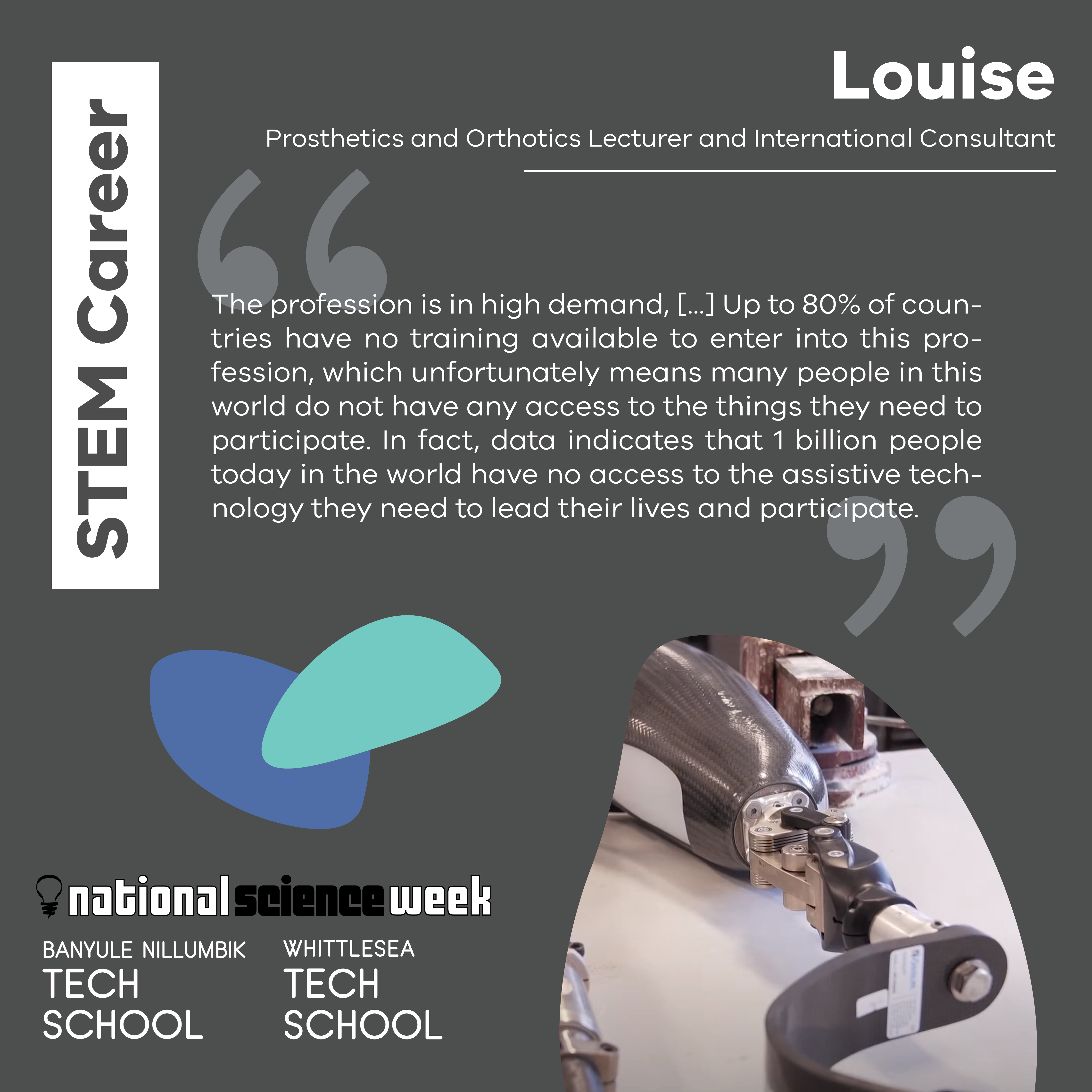

Interview with Louise, La Trobe University
Science-related career paths
The Banyule Nillumbik and Whittlesea Tech Schools are celebrating science-related career paths during National Science Week 2020. The campaign aims to showcase science by celebrating the people that are at the centre! National Science Week 2020 runs from August 15-23. For more information visit the National Science Week website.
When developing our programs, we reach out to industry partners to help us build case studies that improve student’s empathy towards a topic. In 2019, we showcased La Trobe prosthetics and orthotics department as part of our Balancing the Scales Inquiry through a video to highlight the importance of collaboration between different occupations when trying to tackle real world problems. We spoke with Louise, a lecturer in Prosthetics and Orthotics and an international consultant. To read more on what she shared with us, check out the interview below.
What did you study at school?
I studied prosthetics and orthotics at La Trobe University Melbourne, I then went on to study a masters of public health, majoring in policy and management.
What did you do when you left school?
My first professional roles after graduating from La Trobe University Australia with a bachelor’s degree in prosthetics and orthotics were roles as an orthotist/prosthetist, providing clinical services to patients in paediatric hospitals.
This role involved assessing clients with functional limitations or amputations, talking with them to find out about their goals and what they would like to do, whether it be to play a sport, reach a functional goal or to be more independent. Then, working with the client to design a device that would meet those goals.
What do you currently do for work?
I currently work as a lecturer in Prosthetics and Orthotics and as an international consultant.


What did you study at school?
I studied prosthetics and orthotics at La Trobe University Melbourne, I then went on to study a masters of public health, majoring in policy and management.
What did you do when you left school?
My first professional roles after graduating from La Trobe University Australia with a bachelor’s degree in prosthetics and orthotics were roles as an orthotist/prosthetist, providing clinical services to patients in paediatric hospitals.
This role involved assessing clients with functional limitations or amputations, talking with them to find out about their goals and what they would like to do, whether it be to play a sport, reach a functional goal or to be more independent. Then, working with the client to design a device that would meet those goals.
What do you currently do for work?
I currently work as a lecturer in Prosthetics and Orthotics and as an international consultant.
What inspired you to choose this career path?
I wanted a career path where no two days were the same, as I am someone who gets easily bored!
I also was committed to seeking a career where I could make a difference in people’s lives, and work internationally. Prosthetics and orthotics ticked all the boxes for me, it was extremely interesting to study and the hands-on nature of the learning really suited my personality. I enjoyed undertaking clinical placements in different types of workplaces, whether they be private businesses, or public hospitals. With technology emerging rapidly, this is a very exciting industry to be a part of.
How is your career science-related?
Prosthetics and orthotics, is an allied health profession which some people say is a balance between art and science. This is a science related field because it is involves having a strong understanding of the human body, its functions and how to adjust, change or influence the body with external devices, and also a strong understanding of illness and its effect on the body.
Whether it be a prosthetic limb, or an orthosis, the customization of the design, fit and function occurs with each and every client.
Have there been any unexpected implications of your work?
Working as an orthotist/prosthetist, you have the privilege to have a positive impact on the lives of your clients.
The profession is in high demand, both in Australia and internationally. Whilst I always imagined I would have an international career, I didn’t realise the extreme need for services internationally. Up to 80% of countries have no training available to enter into this profession, which unfortunately means many people in this world do not have any access to the things they need to participate. In fact, data indicates that 1 billion people today in the world have no access to the assistive technology they need to lead their lives and participate.
What are you most proud of achieving within this role?
I am proud that through my career in educating orthotic/prosthetic professionals, all around the world, that more people who need these vital services are able to access them. Through training more professionals, and encouraging people to enter this field, I hope that this profession grows and grows.
What would you say are the key skills needed for your role?
Whilst there are many skills involved in this role, I have chosen 3 core areas:
1. Communication skills: It is so important to have the ability to listen and work with clients to establish the goals of any device.
2. Design and fabrication skills: It is important that the skill of working with your hands to design and fabricate orthoses and prostheses is developed.
3. A dedication to lifelong learning. The field is developing all the time, it is so important that professionals are up to date with advancements as they happen which may have the power to positively influence outcomes for clients. Also, not every design works out how you imagined, so the ability to be persistent and try again is a much needed one.
What advice would you give to young people who have an interest in this field?
If you are interested in this field, check out the La Trobe University Australia website to read a bit more about how to enter into this profession via a bachelor’s degree in prosthetics and orthotics.
Also, you can check out some information about the profession in Australia by looking at the Australian Orthotic Prosthetic Associations website at http://www.aopa.org.au.

